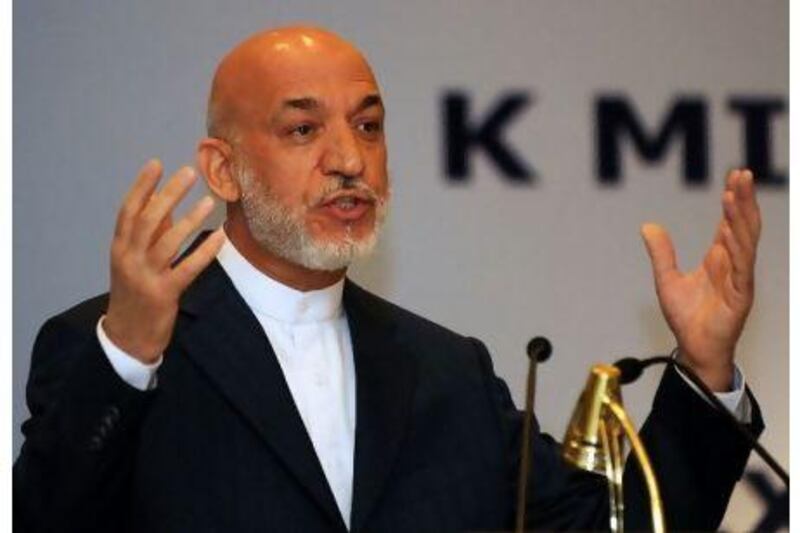NEW DELHI // Afghanistan's president Hamid Karzai sought to reassure Pakistan yesterday after signing a series of agreements to boost trade and security cooperation with India.
"Pakistan is a twin brother, India is a great friend. The agreement that we signed with our friend will not affect our brother," said Mr Karzai in a speech in New Delhi yesterday.
Mr Karzai is on his second visit to India, and is widely seen to be building ties with the Indians out of frustration with Pakistan. Afghan officials claimed that the killing of Burhanuddin Rabbani, the former Afghan president and head of the peace council that conducted talks with the Taliban, was planned by Pakistan-supported Taliban militants in the Pakistani city of Quetta. Pakistan denies being involved in Rabbani's death.
During his speech, Mr Karzai laid out his vision for Afghanistan's future after a decade of war and emphasised that the strategic partnership deals were "not directed against any country" but done to "support Afghanistan".
On Tuesday, Mr Karzai and Manmohan Singh, the Indian prime minister, signed a number of agreements including one under which India will offer more military and police training to the Afghan forces ahead of the US troop withdrawal, scheduled to take place in 2014.
India is already one of the biggest aid providers to Afghanistan, having pledged up to US$2 billion (Dh7.35bn) since 2001 and promised spending on infrastructure, such as the construction of highways.
Yesterday, the Afghan national security adviser, Rangin Dadfar Spanta, reiterated Afghan accusations that Pakistan's Inter-Services Intelligence agency was supporting pro-Taliban militants.
"The Haqqani network and the ISI are one and the same. It is a group managed, trained and led by the ISI," he said.
After the September 20 assassination of Rabbani, Mr Karzai announced that negotiating with the Taliban was "futile," a statement he repeated in his speech yesterday.
"We have decided not to talk to the Taliban because we do not know their address. We do not know where to find them ... therefore we have decided to talk to our brothers, our neighbours in Pakistan," he said.
If the growing rapprochement with New Delhi has ruffled feathers in Islamabad, Pakistani officials have not let it show.
"Both are sovereign countries, they have the right to do whatever they want to," the Pakistani prime minister Yusuf Raza Gilani said yesterday.
Nitin Pai, a fellow at the Takshashila Institution, a think tank in Chennai, believes Mr Karzai's visit to India provides Afghanistan with leverage in future negotiations with Pakistan.
How deep the relationship between India and Afghanistan can develop remains a matter of debate.
"The question is not what Karzai said, but what the Indian prime minister left unsaid: is India capable and willing to play the role of a guarantor of stability in Afghanistan?" said Mr Pai. He said that India was politically unwilling to take on responsibility for security in Afghanistan, which might rile Pakistan, its nuclear-armed rival.
Samir Saran, the vice president of the Observer Research Foundation, which hosted Mr Karzai's address yesterday, said the Afghan leader had a serious message in his speech, directed at Pakistan and America, about how he planned to approach security issues in the future.
"By 2015, Afghanistan will be entirely responsible for its security. Afghanistan will be looking to its affairs on its own in cooperation with India, the United States, Iran, Saudi Arabia and our neighbours," Mr Karzai said in his speech.
Mr Saran said Mr Karzai was diversifying his options for peace and stability.
"The invocation of Iran is a serious message that anything is better than the current situation. He knows he will have to create new partnerships, even if they are with countries like India and Iran."





